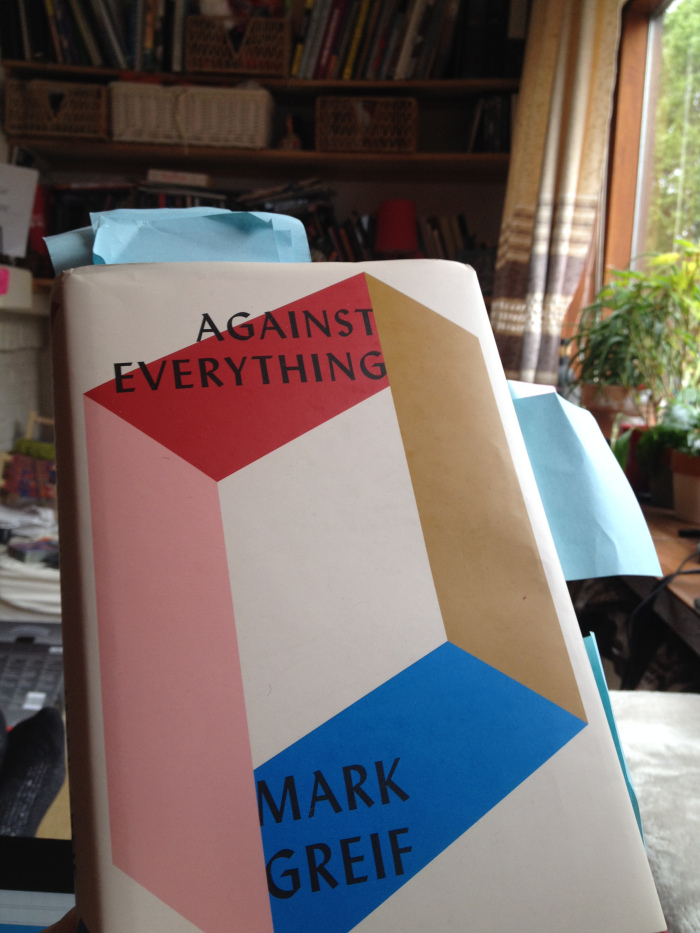Away with hedonism and the rest.
The problem with being against everything is that you slide down the whirlpool of being against yourself; and there you often find the start of your whirlpool too. I have a mind trained to make unusual connections, the ones that art permits and reveals to its disciples. This kind of mind is pleased whenever the web of links shows anomalies, like clots, stretches, or a hiatus.
The book ‘Against Everything: On Dishonest Times‘ by Mark Greif (London-New York: Verso, 2016) is a collection of essays that present in a cool minded way an array of protests. With the voice of a young man and a scholar, the author carefully unfolds on the dissecting table the passions of age groups, style groups, class groups, and the philosophies whereupon our world of today is lingering.
I had to show how every commonplace thing might be a compromise. [p. xi]
Why is it that I thought that this is also a common place, a common knowledge? Is it because of a nearly compulsory critical thinking or because of catching a big shift (or rather its final twist) at its start? Didn’t we see the aesthetic hedonism (the idea that aesthetic value resides solely in a thing’s ability to give us pleasure) taking over within the establishment of consumerism (triumphant for everyone’s consent); these two together eliminating life as we knew it, to the extent that things must be explained as before and after? The author searches the origins of today’s hurtful structures in a depth of more than a century when putting forth the authors Thoreau and Flaubert, and the derailment of the notions of aestheticism and perfectionism.
In the nineteenth century, Flaubert and Thoreau foresaw mud where others saw a perfectly rewarding way of life. Today we’re up to our eyes in it. [p. 88]
This is included in one of the interim chapters sharing a common by-title ‘The meaning of life’. There are four such chapters. Here is where the specific leads to the general, a contemplative step back is taken for viewing the structure with the aim to word it.
Part III of this series is titled ‘Anaesthetic ideology’. Within a few pages, Plato and Aristotle are put on the table, in connection to experience and non-experience, or restriction of it, with mentioning of Socrates and Diogenes the Cynic and the concluding presence of Epicurus. The Epicurean bliss is then connected to the apatheia (no passion, or better not responding to the world’s mud) of Epictetus, in the quest for absolute freedom, in which case self-ending is an option. Both sides of anesthesia (non feeling) are referring to pain. They are like the operas of Richard Strauss where the happy parts are the same hysterical scream as the tragic parts (an amazing thing). That is because despite all, you want to be here.
The sad truth is that you still want to live in their world. It just somehow seems this world has changed to exile you. [p. 227]
Philosophy does help us find a position, see what we do and maybe why; see also why we feel guilty and whether there is anything we can do to improve all that.
The essays look at subjects partly of our lived youth and further, carrying a question mark (with a kind of sympathy or inevitable association?). Radiohead, punk, rap, a good historical account of the hipsters (had no idea), teenage bodies of grown-up women, the fitness (have tried and failed; my body is a stoic philosopher on this), reality tv, and some sides of American reality which we can read only with the cognition (I’m afraid).
Decomposing things in present tense and in writing is interesting indeed, and wise. Surely wiser than counting the number of ‘NOs’ you’ve said in practice.
P.S.1 Epictetus was a presence in my youth, through the writings of Jason Xenakis who followed the path of self-determination to the end. I recently came across this essay: The post-existentialist neo-stoicism of Jason Xenakis and the stoic theory of suicide.
P.S.2 Whatever happened to aesthetic beauty as the condition where the content falls into the form without flaw (in the same way that the soul falls into the body in/through martial arts and such)?






